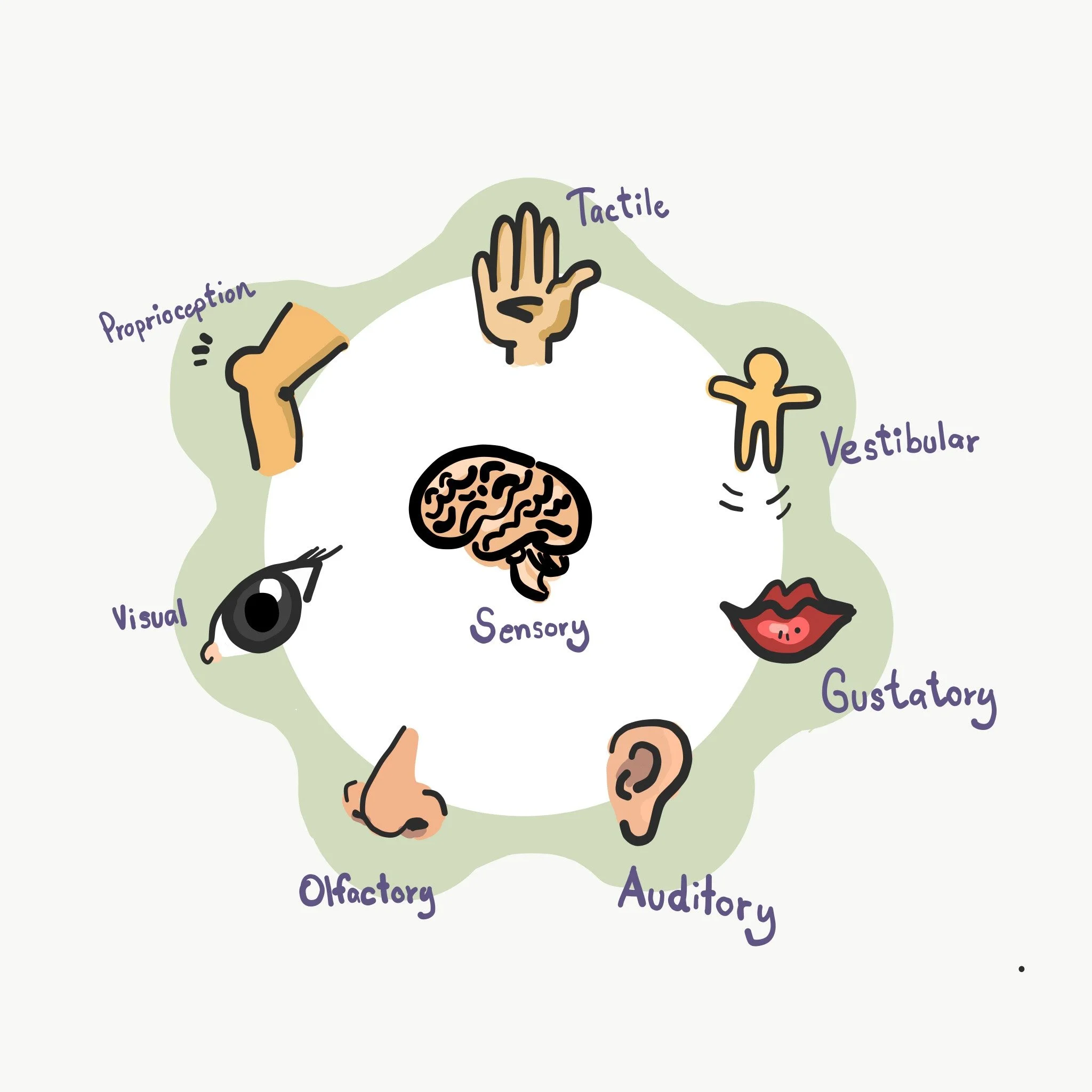The "Moral Compass" of the Neurodivergent Brain: Understanding Justice Sensitivity
Justice sensitivity is a heightened awareness of and strong emotional, cognitive, and behavioral reactions to perceived unfairness or wrongdoing, often leading individuals to notice injustice more, spin on it intensely, and feel a powerful drive to correct it. Justice Sensitivity is not exclusive to the neurodivergent. Though it is often associated with ADHD and Autism, neurotypical people can experience, too.
Making Spirits Bright (and Comfortable): A Guide to Sensory-Friendly Holiday Celebrations
The winter holidays are often billed as the "most wonderful time of the year." We think of twinkling lights, festive music, gathering with loved ones, and delicious feasts. But for many neurodivergent individuals—those with ADHD, Autism, or Sensory Processing differences—this season can feel less like a wonderland and more like a sensory minefield.
If you or a family member is neurodivergent, you might notice that the holidays bring on extra fatigue, irritability, or the need to withdraw. This isn't about being a "Scrooge." It’s about biology.
Today, let’s talk about what sensory sensitivities actually are, why the holidays are the perfect storm for them, and how we can tweak our traditions to make sure everyone actually enjoys the celebration.
The Golden Rule of Neurodiversity: Why Accommodation Helps Everyone
In my practice at QC Psych Testing, PLLC, I often encounter the core conflict faced by neurodivergent individuals: the constant pressure to behave, think, and communicate as if they were neurotypical. We’ve talked a lot about the immense energy spent on masking—the effort to suppress natural Autistic traits or ADHD-driven behaviors just to fit in.
This brings up a crucial question about how we design our schools, workplaces, and social settings. The answer lies in a simple, foundational principle: Treating neurotypical people as if they are neurodivergent doesn't hurt them, but treating neurodivergent people as if they are neurotypical actively harms them.
The 5 Myths About Autism—Setting the Record Straight
I spend a lot of time helping clients understand their brains. For those seeking an Autism assessment, the journey is often cluttered with misinformation. The public understanding of Autism Spectrum Disorder (or just Autism, as many in the community prefer) is frequently based on stereotypes and outdated science, which creates real barriers to self-acceptance and getting the right support.
To be fair, there is still a ton we don’t know about Autism and the Diagnostic Statistical Manual (DSM) we use to standardize diagnostic criteria is a living document subject to change as our knowledgebase grows. That said, there are things we do know.
Today, I want to take on the most common, harmful myths I hear about Autism—its origins, its expression, and what "treatment" truly means from a neurodiversity-affirming perspective.
Debunking the Top 5 Myths About ADHD
The term Attention-Deficit/Hyperactivity Difference (ADHD) is one of the most misunderstood concepts in the realm of neurodiversity. For decades, it’s been clouded by outdated stereotypes, dismissive clichés, and a fundamental misunderstanding of how the ADHD brain actually works.
These myths aren't harmless—they fuel stigma, prevent people from seeking accurate assessments, and deny individuals the support they need to thrive.
At QC Psych Testing, PLLC, I believe in providing clear, affirming facts. Let’s tackle five of the most common myths about ADHD—its nature, its trajectory, and its management—and replace them with a neurodiversity-affirming reality.
Neurodivergence and the Elevated Risk for Suicide
September is Suicide Prevention Month, a time to raise awareness and foster conversations that can save lives. While suicide is a complex issue with no single cause, certain populations face an elevated risk. Among these are individuals with undiagnosed ADHD and/or Autism.
Many people are surprised to learn about this connection, but when you peel back the layers of a life lived without understanding your own neurotype, the reasons become painfully clear. For those with undiagnosed ADHD or Autism, the world can be a confusing, overwhelming place. They may spend a lifetime trying to figure out why they feel so different, leading to chronic feelings of hopelessness, loneliness, and despair.
The Autistic Mask: Why Autistic Girls and Women are Often Overlooked
When you think of an autistic person, what comes to mind? For many, the image is still of a young boy who struggles with social cues, has a deep fascination with numbers or trains, and perhaps engages in repetitive movements. While this is one way autism can show up, it’s not the only one. This narrow, outdated view has a significant and unfortunate consequence: it leaves a vast number of individuals—specifically, autistic girls and women—completely overlooked.
Autistic girls and women often present so differently from their male peers that they are frequently missed in the diagnostic process. Their autism isn't less real; it's just harder to see because it doesn't fit the classic stereotype. In this post, we'll explore the reasons why so many autistic girls and women go undiagnosed and what we, as a community, can do to change that.
The Hidden Struggle of ADHD in Women & Girls
In adolescence, these symptoms can be easily mistaken for other issues. A girl who is struggling academically might be labeled as "lazy" or "not trying hard enough." Her social struggles might be dismissed as shyness or social awkwardness. The internal turmoil of constantly feeling overwhelmed, disorganized, and misunderstood is often mistaken for anxiety, depression, or a personality trait rather than a neurodevelopmental condition. Complicating things even further, girls often tend to respond more strongly to social pressures to conform, leading to perfectionistic tendencies that also mask ADHD symptoms.
Reframing the Narrative: How CBT Can Help Undo a Lifetime of ADHD Cognitive Distortions
From a young age, many people with ADHD receive feedback that highlights their differences as deficits. The "you're not trying hard enough," "you're so smart, but you're so lazy," and "why can't you just focus?" comments can accumulate over a lifetime, subtly and sometimes not-so-subtly shaping the way we see ourselves.
Beyond the Hobbies: Embracing Intense Interests in Neurodivergent Brains
One of the most common and powerful themes that emerges is the concept of intense interests—what many in the community proudly call special interests or, in some contexts, hyper-focus. These are far more than just hobbies; they are sources of profound joy, deep knowledge, and essential regulation.
For neurodivergent individuals, these interests often run far deeper than typical pastimes, shaping identity, well-being, and daily life. Let’s explore these distinct forms of intense engagement and how they manifest in different neurotypes.
When Your Brain's Battery Hits Zero: Burnout and ADHD
Burnout is a serious signal from your brain and body that something needs to change. For adults with ADHD, that signal is often louder and requires a more nuanced, compassionate approach to recovery.
Unpacking Executive Functions: Your Brain's Command Center and How It Manages Memory in ADHD and Autism
Have you ever felt like your brain has a million tabs open, or you know exactly what you need to do but can't quite get started? Or perhaps you've struggled to recall a memory that feels just out of reach? These experiences often tie back to something psychologists call executive functions. Think of executive functions as your brain's sophisticated "command center" or its "management team." These are the higher-level cognitive skills that help you plan, organize, manage your time, control impulses, regulate emotions, and remember things to effectively achieve your goals. Essentially, they bridge the gap between knowing what to do and actually doing it.











